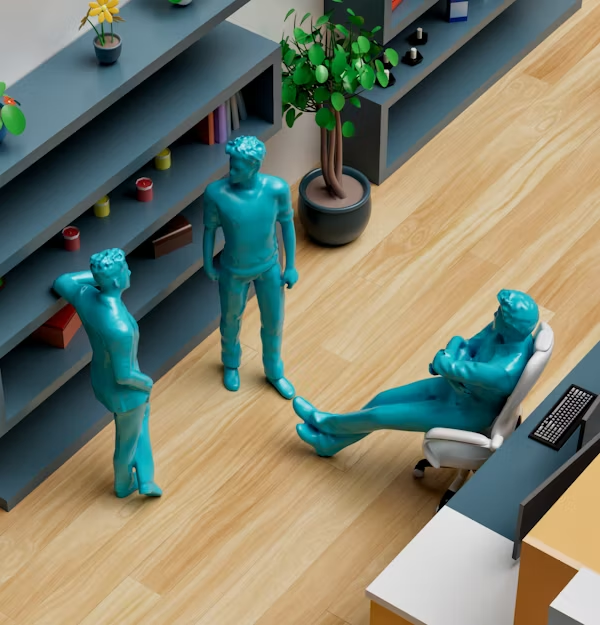Eczema in the Workplace: Managing Flare-Ups in Professional Settings
Whether it’s shaking hands during a meeting or sitting in air-conditioned offices for hours, working with eczema can be challenging. For many, the workplace is a daily obstacle course filled with hidden triggers—ranging from stress to harsh hand soap—that can lead to redness, itching, and inflammation.

Eczema in the workplace doesn’t just affect your skin—it can impact your focus, confidence, and productivity. But with thoughtful strategies and the right support, it’s possible to navigate your job while keeping flare-ups in check.
This guide explores how to manage eczema in the workplace, from identifying common triggers to building an eczema-friendly work routine, so you can stay professional, comfortable, and in control.
Why the Workplace Can Be a Hotspot for Eczema Flares
Eczema, or atopic dermatitis, is a chronic inflammatory skin condition driven by a compromised skin barrier and immune overreaction. The workplace can challenge both, especially in environments with:
- Air conditioning or low humidity, which dry out the skin
- Harsh soaps and frequent handwashing, especially in healthcare, education, or food service
- Stressful workloads, which can increase inflammatory markers
- Exposure to irritants, like paper dust, cleaning products, or synthetic fabrics
- Limited access to skincare during working hours
A 2022 review in Occupational Medicine confirmed that occupational eczema is rising, especially in jobs with frequent hand hygiene, chemical exposure, or stress-related inflammation.
Common Workplace Triggers to Watch Out For
Every workplace is different, but these are some of the most common eczema triggers across professional settings:
Hand Irritants
Frequent handwashing, alcohol-based sanitizers, and powdery gloves can strip moisture and lead to hand eczema (also called dyshidrotic eczema).
Indoor Climate
Dry air from HVAC systems or poorly ventilated environments can dehydrate the skin and disrupt its protective barrier.
Cleaning Agents and Office Supplies
Disinfectants, printer toner, adhesives, paper fibers, and dust can all cause skin irritation—especially if you’re handling materials regularly.
Workplace Stress
Stress doesn’t just affect the mind—it releases cortisol and other inflammatory hormones that can worsen flare-ups and delay healing.
How to Manage Eczema at Work: 9 Practical Tips
1. Keep a Skincare Survival Kit at Your Desk
Include:
- A travel-sized fragrance-free moisturizer
- Barrier cream for hands
- Antibacterial hand wipes (alcohol-free)
- Cotton gloves (if you need to do cleaning or paperwork for long periods)
Try NellaDerm’s dermatologist-formulated moisturizer, designed for on-the-go hydration without greasy residue.
2. Use a Desk Humidifier
Adding moisture to the air can help combat office dryness, especially in winter. Look for a USB-powered mini humidifier that fits on your desk and runs quietly.
3. Apply Moisturizer After Every Handwash
Every wash removes natural oils from your skin. Reapply emollient immediately to lock in hydration and protect the skin barrier.
4. Switch to Gentle Hand Hygiene Products
Ask HR or facilities if unscented, non-irritating soap or alcohol-free sanitizer can be made available—especially if multiple employees experience skin dryness.
5. Wear Breathable, Natural Fabrics
If you have a uniform or dress code, try layering with cotton underneath synthetic materials. Avoid tight collars or sleeves that may cause friction.
6. Take Micro-Breaks to De-Stress
Practice brief mindfulness, breathwork, or stretching during high-stress days. Even five minutes can lower cortisol levels and reduce eczema-related inflammation.
7. Disclose If You Feel Comfortable
Telling your manager or HR about your condition can help you access accommodations, such as working near windows, adjusting cleaning routines, or using your own skincare products.
8. Bring Your Own Supplies
If office soaps, paper, or cleaning sprays trigger your skin, bring your own versions and store them in a labeled pouch. It’s better than risking a flare.
9. Avoid Scratching During Meetings or Calls
Keep a stress ball or fidget tool at your desk to redirect the urge to scratch during high-focus moments like presentations or Zoom calls.
Managing Appearance and Confidence
Visible eczema—especially on the face, neck, or hands—can affect professional confidence. While it’s important to treat the physical symptoms, managing the emotional impact matters too.
Tips for Confidence at Work:
- Use a tinted moisturizer or barrier balm if your flare is red and visible.
- Prepare short, neutral responses if someone asks about your skin (e.g., “It’s just a flare-up—under control.”)
- Wear clothing that feels comfortable, not concealing—tight, itchy fabrics can make things worse.
- If needed, take personal time during severe flares to heal without pressure.
Remember: Your condition doesn’t diminish your professionalism. Many people quietly manage chronic conditions—eczema just happens to be visible.
Know Your Rights: Eczema as a Chronic Health Condition
In many regions, eczema may qualify as a manageable chronic condition under workplace disability laws—especially if it interferes with your ability to do your job comfortably and safely.
You may be entitled to:
- Reasonable accommodations (like bringing your own soap or working in ventilated areas)
- Modified tasks if cleaning products or gloves are mandatory
- Flexible breaks to reapply treatment or relieve discomfort
If unsure, talk to HR or consult a workplace health advocate.
Q&A: Eczema in the Workplace
Q1: What should I do if my job makes my eczema worse?
Document your flare-ups, identify triggers, and speak with your manager or HR. Propose solutions (e.g., gloves, soap switch, desk fan) and seek accommodations.
Q2: Can work stress really cause a flare-up?
Yes. Stress hormones like cortisol trigger immune responses that can worsen eczema. Prioritizing stress reduction is as important as skincare.
Q3: Should I use medicated creams at work?
Yes—if prescribed by your dermatologist and needed during a flare. Keep them in a labeled pouch and store them discreetly if privacy is a concern.
Final Thoughts
Eczema in the workplace doesn’t have to be a barrier to doing your job confidently and comfortably. By identifying your unique triggers, building a proactive care routine, and advocating for your needs, you can take charge of your skin health—without compromising your professionalism.
Remember: You’re not alone. Millions of people manage eczema at work every day, and with the right tools and support, so can you.
For barrier-friendly, workplace-safe products designed for eczema-prone skin, explore NellaDerm’s collection and keep your care consistent—wherever your career takes you.
Our Promise to You
We’re confident our products will transform your skin—but if you’re not completely satisfied, we’ve got your back. Simple as that. Try our products risk-free for 30 days. If you don’t love your results, reach out to our care team and we’ll make it right with a full refund. No questions asked, no complicated returns process. Because everyone deserves skincare that works.

